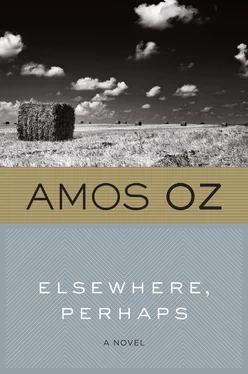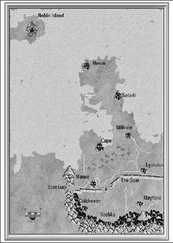At times, when the roaring crowd acclaims the impressive agility of Tomer Geva on the basketball court in Metsudat Ram, or when we watch Oren wrestling with one of the boys, subduing him with icy rage, then we, too, think thoughts that we conceal in our breast and do not try to share with any stranger.
The first to break away was the eldest brother, Nehemiah. There was a boss-eyed rabbinical student in Kovel, who was something of a politician, something of a womanizer, and something of a philosopher. He it was who persuaded Nehemiah to escape from his father's house to Lvov and to make his way on to the university there.
Ezra was swept away, like so many young men and women, by the youth movement. He and his friend Aaron Ramigolski went up to Palestine together, to become founder-members of our kibbutz. The rest is well known.
Zechariah was banished because of the dogs.
It happened during Passover week, when he was still a young boy. Some gypsies came to Kovel and set up their tents on some land just outside our quarter, to the east. Each night from their camp there came the sounds of melancholy singing and loud bursts of coarse laughter. The nomads had dogs. Wild, starved dogs, of a savage disposition but also given to obsequious fawning. Zechariah made their acquaintance and won their favor with tidbits that he threw them. He took an unwholesome pleasure in playing with the dogs and lavishing caresses and other signs of affection on them.
Occasionally he observed them mating. At night he was consumed by an unnatural urge. Zechariah was a solitary boy, and from his earliest days all his actions had displayed an isolated arrogance.
On one occasion his father caught him playing with the dogs. Perhaps one of the local boys, one of his many childhood enemies, had informed on him. A terrible thing happened then: the father beat his son soundly, and the son, sobbing and hardly knowing what he was doing, set his allies the dogs on his father. The nomads' dogs, for all their obsequious fawning, were of a savage disposition. The whole neighborhood was shocked. The cantor's two eldest sons had already broken with their father, and now the youngest, too, was going to the bad.
Zechariah left his father's house under a curse, and became a bitter man. At first he went to Rovno, where he worked for a Polish farmer, but after a month the peasant dismissed him in a panic. His bearing had called to the man's mind an incident that had happened some years before, when a young Polish lad had taken to firing haystacks from political motives. Zechariah's eyes at times emitted grim flashes.
From Rovno he went on to Warsaw and took a job as a printer's apprentice with a well-known Jewish newspaper. At that time he had a non-Jewish girl friend, a pretty, hysterical girl who lived with him. Then the Germans came and imprisoned him in the ghetto. He escaped and traveled widely: he went to Russia; he may have gone to Sweden; he spent some time after the end of the war in a displaced persons' camp in Italy; from Italy he traveled with a widow to Atlit, and from Atlit to another camp in Cyprus. He returned to Atlit again in 1949, and from there he went, without the woman, to Ramla and then on to Jaffa. In Jaffa he found a partner and went into business for a year. After that he took his leave of his brothers and returned to Europe, to say a prayer in Kovel. He never reached Kovel. He made a detour to Germany, made various representations, and secured some reparation money. In Munich he met Isaac Hamburger, and established a flourishing partnership with him.
As for Nehemiah, he had a bitter struggle. He finished his course at the University of Lvov in abject poverty, taught general history in the Jewish gymnasium, emigrated to Palestine a few weeks before the outbreak of war, and came to Kibbutz Metsudat Ram. Ezra and Bronka did everything they could for him, but the physical work defeated him. He suffered the same fate, he often says, as Yehezkel Hefetz and Yitzhak Kumer in the stories by Brenner and Agnon. It was only to be expected, he adds with a faint smile, since the whole pattern of his life exactly matches that of the unfortunate heroes of the Hebrew novels of the last generation.
Ezra Berger, then, is unique among his brothers. Ezra Berger married and had children, and helped to establish Kibbutz Metsudat Ram. His life is not doomed to sterility. There is a moral in this: men are not condemned inevitably to an accursed, tedious life of sterility. With an effort of will a man can avert the curse and hew out a path of his own.
Finally, after a hard struggle, Reuven Harish's poem:
Chilly night with arms of metal
Settles slowly on our groves:
Black and scowling in the fields,
Menacing, the night wind roves.
Brief indeed is night's dominion:
Glaring searchlights pierce the gloom,
Criss-crossing on barbed-wire fences,
Scattering the birds of doom.
Sleep holds our beleaguered village,
But the watchmen never sleep;
Vigilant, they clasp their weapons,
While around the jackals weep.
Though the barren mountain threatens
To engulf us with its might,
Yet we have a strong protection
In our adamantine light.
Reuven had to go to Tel Aviv, to see the director of the publishing house of the movement and discuss with him the details of a new volume of his poems. He left the kibbutz early in the morning. By half past nine he was in Tel Aviv and by ten o'clock he had concluded his business, since the head of the publishing house was an old friend. They quickly reached complete agreement about the details of the publication, shook hands on the deal, and had a friendly chat over a glass of iced grapefruit juice. At a quarter past ten Reuven wondered whether to go to Jerusalem to look up some friends of his there. But at the central bus station a curious incident unsettled his plans. Things never turn out quite as one expects.
The bus station was thronging with noise and bustle. The hawkers raised their loud voices in competition with each other, having no care in the world beyond moneymaking.
Reuven walks slowly along the narrow streets around the bus station, now looking down at the pavement, now taking in the noisy street scene. His time is his own, and he enjoys his pensive stroll. He is detached from the nervous bustle all around him, untouched by the feverish activity. His clear forehead wears a lively look. His green glance roves from the brightly colored stalls to the faces of the passers-by, to the cars rumbling heavily through the narrow streets. His gait is calm and measured.
Reuven is wearing a neatly ironed white shirt over his blue trousers. His black leather brief case weighs next to nothing, containing as it does a few pages of poetry, a newspaper, and two sandwiches wrapped in brown paper. His face is gaunt, his forehead high, his eyes full of lively curiosity. Now and then he pauses to glance at a stall covered with colorful erotic magazines, or at a peddler carrying a tray of crude, cheap knickknacks. Sometimes his eyes linger on a well-built woman tripping along on high heels. Everyone dies eventually, as the crazy Dutchman said.
"He's right," Reuven suddenly says, so loudly that a nearby shoeblack looks up and asks:
"What?"
"No, it's all right," Reuven answers absently. "Thank you very much." At once his glance rests on a little boy in tears. A boy of five or six, standing between the fresh-fruit-juice stands and sobbing like an orphan. Nobody is taking any notice of him. Reuven hurries across the road. There is nothing more distressing than a lost child.
"What's the matter, sonny?"
The child doesn't answer but bawls even louder.
"What's your name?"
The boy opens his red eyes for a moment, then closes them again, and lets out a sound like the shrill wail of a beaten dog.
Читать дальше












